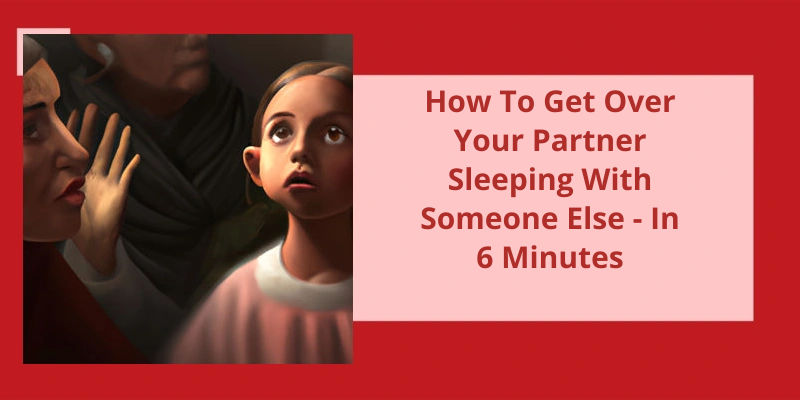Amidst the heartache and pain, there may come a time when we stumble upon our ex-partner, seemingly happy and content without us. While it’s natural to wish for the best for our former loved ones, seeing them genuinely joyful without our presence can unexpectedly stir up a whirlwind of mixed emotions within us. As we grapple with feelings of nostalgia, sadness, and even longing, it becomes apparent that witnessing our ex's happiness can serve as a bittersweet reminder of the past and the loss we’ve experienced. In this intricate dance between conflicting emotions, it’s crucial to delve into the underlying reasons why their happiness can evoke such profound sadness within ourselves, and explore avenues of healing and growth that will allow us to navigate these complex emotions with grace and resilience.
Why Does Seeing My Ex Still Make Me Sad?
Even if you’ve moved on and are happy in your own life, it’s natural to feel a twinge of sadness when you see your ex happy. It’s a reminder of what once was and the emotions that were once shared. Seeing your ex happy may evoke memories of the good times as well as the pain of the breakup.
It reminds you that you once had someone to share your life with, and now that connection is gone. It’s a reminder that you may still be searching for that deep emotional connection again.
Even if you’re happy in your own life, it’s natural to compare yourself to your exs new partner. You may wonder why they can make your ex so happy when you couldnt. This can lead to feelings of inadequacy and self-doubt.
When a relationship ends, so do the future possibilities you once imagined. Seeing your ex moving on and finding happiness with someone else can make you mourn the loss of those dreams.
Even if you’ve healed and moved on, seeing your ex happy can bring back some of those old feelings and make you relive the emotions you once felt.
It’s important to acknowledge and allow yourself to feel these emotions, but also remember that it’s okay to be happy in your own life, even if your ex has moved on.
How to Focus on Self-Love and Acceptance After a Breakup
- Embrace your emotions and allow yourself to grieve
- Practice self-care and prioritize your well-being
- Engage in activities that bring you joy and fulfillment
- Surround yourself with a supportive network of friends and family
- Focus on personal growth and set new goals for yourself
- Challenge negative thoughts and replace them with positive affirmations
- Forgive yourself and your ex-partner for any mistakes made
- Develop a positive mindset and cultivate gratitude
- Engage in therapy or counseling to process your emotions
- Take time for self-reflection and learn from the breakup experience
Instead, focus on cultivating your own happiness and well-being. Show your ex that you’ve moved on and are thriving in your own life. Embrace positivity, confidence, and a genuine glow that radiates from within. Let your happiness be a reflection of your own self-improvement, rather than a reaction to their presence. By showcasing your contentment without depending on their validation, you send a powerful message that you’re truly happy without them.
How Do You Show Your Ex That You Are Happy?
When it comes to showing your ex that you’re happy, subtle actions can speak volumes. One effective approach is to wear a genuine smile whenever you encounter them. However, it’s crucial to avoid conveying any form of flirtation or longing through your smile. The objective is for them to perceive your happiness as a result of a fulfilling life, not simply because you’ve laid eyes on them.
It’s essential not to allow the past unhappiness that surrounded the breakup to affect your current mood. Letting go of those negative emotions and focusing on your personal growth is key. This mindset won’t only contribute to your well-being but also demonstrate to your ex that you’ve moved forward and found happiness in your life.
Additionally, another way to exhibit your happiness is by surrounding yourself with supportive friends and engaging in activities that bring you joy. Being in the company of loved ones and participating in fulfilling pursuits will naturally radiate positive energy. These actions can serve as living proof that you’ve found happiness independently of any interactions with your ex.
Another crucial aspect is to avoid seeking revenge or deliberately making your ex jealous. Instead, concentrate on your own happiness and personal growth. Showcasing your success and contentment in a genuine and organic manner will speak louder than any vengeful acts.
Overall, the key to demonstrating your happiness to your ex lies in staying true to yourself and not seeking validation from them. Focus on building a fulfilling life and projecting genuine happiness without any ulterior motives. Ultimately, your ex will notice and possibly start to question their own emotions, which can serve as a catalyst for their own personal growth and reflection.
Maintaining a Positive Attitude and Mindset After a Breakup
- Allow yourself to grieve and feel the emotions that come with the breakup.
- Focus on self-care and prioritize your physical and emotional well-being.
- Surround yourself with supportive friends and family who uplift and encourage you.
- Engage in activities that bring you joy and help you maintain a positive outlook.
- Practice gratitude and focus on the positive aspects of your life.
- Avoid dwelling on negative thoughts and instead redirect your energy towards personal growth.
- Set goals for yourself and work towards achieving them, finding motivation in your own accomplishments.
- Accept that healing takes time and be patient with yourself throughout the process.
- Seek professional help or counseling if needed to help you navigate through difficult emotions.
- Remember that a breakup doesn’t define your worth and that you deserve happiness and love.
However, there could be other underlying reasons for your tears. They may stem from a sense of relief or even a tinge of nostalgia. Understanding the emotions behind your tears can provide valuable insight into your healing process and help you move forward in a healthy way.
What Does It Mean When You Cry When You See Your Ex?
It’s natural to feel sadness when you see your ex happy because it reminds you of the loss you experienced. Seeing them enjoying life without you can be a painful reminder of what you once had and what’s now gone. It’s a sharp contrast to the emotions you may be feeling, such as heartbreak, loneliness, and longing. This can intensify your feelings of sadness and make it difficult to move on.
You might start questioning yourself and wondering if you could have done something differently to salvage the relationship. Seeing them happy may make you question why you werent able to make them happy when you were together. These thoughts and feelings of regret can be overwhelming and contribute to your tears.
Seeing them happy with someone else can make you question your own desirability and worthiness of love. It may bring up feelings of inadequacy and the fear that you may never find happiness with someone else. These insecurities can amplify your sadness and contribute to your tears.
It’s a complex mix of emotions, including sadness, regret, betrayal, fear, and the need to release pent-up emotions. It’s important to remember that healing takes time and that it’s okay to feel all of these emotions. Eventually, with self-care and support, you’ll be able to move forward and find happiness again.
Coping Strategies for Dealing With Sadness After Seeing Your Ex Happy
- Engage in self-care activities such as exercise, meditation, or taking a relaxing bath.
- Talk to a trusted friend or family member about your feelings.
- Write about your emotions in a journal to process and release them.
- Redirect your focus by engaging in hobbies or activities that bring you joy.
- Practice mindfulness and stay present in the moment.
- Seek professional help if needed, such as speaking to a therapist or counselor.
- Avoid dwelling on the past and instead, focus on personal growth and moving forward.
- Surround yourself with positive influences and supportive people.
- Take a break from social media to limit exposure to triggering content.
- Practice self-compassion and remind yourself that it’s normal to feel sad, but it will pass.
Why Do I Feel Hurt When I See My Ex With Someone Else?
The emotions that arise when seeing your ex with someone else can be complex and challenging to navigate. It isn’t uncommon to feel hurt or sad in this situation, even if you’ve moved on and want the best for your ex. One reason for these mixed emotions is the doubt that arises regarding the authenticity of your past relationship.
When you see your ex with someone new, it’s natural to question whether they truly loved you as deeply as they claimed. Insecurities may surface, causing you to wonder if your partners feelings were as genuine as you believed. These doubts can trigger feelings of sadness and hurt, as they challenge the narrative you’d created around your past relationship.
Another factor contributing to these mixed emotions is the fear of being replaced or forgotten. Witnessing your ex happy in a new relationship can intensify the sense of loss and make you question your own worth. It isn’t uncommon to compare oneself to the new partner, leading to a feeling of inadequacy and further sadness.
Strategies for Managing Negative Emotions and Thoughts When Encountering Your Ex’s New Relationship.
- Practice self-care activities, such as taking walks or baths.
- Engage in hobbies or activities that bring you joy.
- Talk to a trusted friend or family member about your feelings.
- Keep a journal to express your emotions and thoughts.
- Avoid stalking or checking social media profiles of your ex or their new partner.
- Focus on positive aspects of your own life and accomplishments.
- Seek professional help from a therapist or counselor if needed.
- Engage in mindfulness or meditation exercises to stay present and calm.
- Set healthy boundaries with your ex and their new partner to protect yourself.
- Take time to heal and process your emotions at your own pace.
Now, let’s explore some practical steps you can take to cope with the lingering sadness and ensure it doesn’t develop into something more serious like depression.
Is It Normal to Still Feel Sad About an Ex?
Is it normal to still feel sad about an ex? Absolutely. Breaking up with someone can be a deeply emotional experience, filled with a range of conflicting emotions. Even if you were the one who made the decision to end the relationship, it’s understandable to still feel a sense of loss and sadness. After all, you invested time, energy, and emotions into the relationship, and it’s only natural to mourn the end of that chapter in your life.
Feeling low after a breakup is natural and part of the healing process. It’s important to allow yourself to grieve and process the emotions that come with it. Give yourself permission to feel sad, angry, or even confused. These emotions are completely valid and shouldn’t be dismissed or suppressed. Allow yourself the time and space to heal and gradually move forward.
However, it’s essential to distinguish between normal grief and clinical depression. Grief tends to lessen over time, as you come to terms with the end of the relationship and adjust to your new reality. On the other hand, untreated depression can persist and impact various aspects of your life. If you find that your sadness is becoming overwhelming, interfering with your daily functioning, or lasting for an extended period, it may be helpful to seek professional support.
Remember, healing takes time, and everyones journey is different. It’s essential to give yourself permission to feel what you feel without judgment. Surround yourself with a support system of friends and loved ones who can provide a listening ear and offer comfort. Take care of yourself by engaging in activities you enjoy, practicing self-care, and focusing on personal growth. With time and self-care, you’ll find yourself gradually moving forward and embracing happiness once again.
How to Differentiate Between Normal Grief and Clinical Depression After a Breakup
After a breakup, it’s common to experience a range of emotions, including grief and sadness. However, it’s important to differentiate between normal grief and clinical depression. Normal grief usually involves feelings of sadness, anger, and loss, but it tends to lessen over time as you heal. On the other hand, clinical depression is a mental health condition that can persist for an extended period, affecting your daily life and overall well-being.
Some key differences between normal grief and clinical depression include:
1. Duration: Normal grief typically lasts for a few weeks to a few months, whereas clinical depression persists for longer periods, often exceeding two weeks.
2. Intensity: While normal grief can be intense and overwhelming, clinical depression is characterized by a more persistent and severe sense of hopelessness, emptiness, and despair.
3. Functioning: Grief may temporarily impact your ability to function in various areas of life, but with clinical depression, there’s a notable decline in functioning that can persist for an extended duration.
4. Thoughts and behaviors: In grief, you may experience thoughts and reminders of the relationship and the loss, but in clinical depression, negative thoughts, feelings of worthlessness, and suicidal ideation are more prevalent.
If you feel that you’re experiencing symptoms of clinical depression, it’s important to seek professional help from a mental health provider. They can provide an accurate diagnosis and offer appropriate treatment options tailored to your needs.
Conclusion
In conclusion, the experience of encountering a former partner's happiness can evoke a complex mixture of emotions, particularly sadness. This reaction may arise from a variety of factors, including unresolved feelings, ongoing attachment, and the painful reminder of a lost connection. It’s crucial to recognize and validate these emotions, as they play a significant role in the healing process. By acknowledging and understanding the nuanced nature of these mixed emotions, individuals can navigate the path to personal growth and ultimately find their own happiness.






